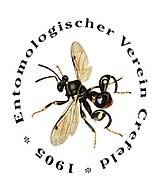
Summary
The Entomologischer Verein Krefeld (EVK) is an entomological society based in Krefeld, North Rhine-Westphalia, Germany. Founded in 1905, it keeps meticulous records and specimens of the area's insects, a collection curated since 1987 by entomologist Martin Sorg.[1][2]
 | |
| Abbreviation | EVK |
|---|---|
| Formation | 1905 |
| Purpose | Maintaining records of the area's insects |
| Headquarters | Marktstraße, Krefeld, Germany |
Key people | Martin Sorg (curator) |
| Website | Entomologischer Verein Krefeld e.V. |
The EVK is known in particular for a study it conducted, published in PLOS One in 2017, that demonstrated a 75 percent decline in flying insect biomass in 63 nature reserves in Germany between 1989 and 2016.[3][4] The paper became the "third most frequently cited scientific study" of 2017 in the media, according to The Economist.[5]
Membership edit
Based in a former school in Krefeld's Marktstraße, the EVK has around 50 members, many of them hobbyists, who, according to Gretchen Vogel in Science, "have become world experts on their favorite insects". One member, Siegfried Cymorek, who did not graduate from high school, was awarded an honorary doctorate in 1979 by the Swiss Federal Institute of Technology in Zurich for his research into the woodboring beetle.[2]
The society is a member of the Deutsche Gesellschaft für allgemeine und angewandte Entomologie (German Association for General and Applied Entomology).[6]
Curators edit
- Ernst Puhlmann (1864–1959), from before World War II until 1943
- Bruno Maixner (1902–1999) from 1943 to 1958
- Siegfried Cymorek (1927–1987) from 1958 to 1987
- Martin Sorg, since 1987[1]
2017 study edit
The society is noted for a study it conducted, first published in 2013, in which it examined data from malaise traps in 63 nature reserves in Germany, most of them in the Krefeld area.[7][2][4] Reanalysed and republished in 2017 in PLOS One, the study showed that, between 1989 and 2016, there had been a 75 percent decline in flying insect biomass in the nature reserves.[3] The paper attracted widespread attention.[8][9][10][11][4][12][13][14][15] According to The Economist, it was the "third most frequently cited scientific study" in the media in 2017.[5] The society won a Science Hero prize for the work.[16]
See also edit
References edit
- ^ a b "Entomologische Sammlungen Krefeld". Entomologischer Verein Krefeld. Archived from the original on 10 February 2017.
- ^ a b c Vogel, Gretchen (10 May 2017). "Where have all the insects gone?". Science. doi:10.1126/science.aal1160.
- ^ a b Hallmann, CA; Sorg, M; Jongejans, E; Siepel, H; Hofland, N; Schwan, H (18 October 2017), "More than 75 percent decline over 27 years in total flying insect biomass in protected areas", PLOS ONE, 12 (10): e0185809, doi:10.1371/journal.pone.0185809, PMC 5646769, PMID 29045418
- ^ a b c Sally McGrane (4 December 2017), "The German Amateurs Who Discovered 'Insect Armageddon'", The New York Times, archived from the original on 5 December 2017, retrieved 17 February 2019
- ^ a b "Cry of cicadas: The insect apocalypse is not here but there are reasons for concern". The Economist. Vol. 430, no. 9135. 23 March 2019. p. 71.
- ^ "Themen". Entomologischer Verein Krefeld. Archived from the original on 10 February 2017.
- ^ Sorg, M.; Schwan, H.; Stenmans, W.; Müller, A. (2013). "Ermittlung der Biomassen flugaktiver Insekten im Naturschutzgebiet Orbroicher Bruch mit Malaise Fallen in den Jahren 1989 und 2013" (PDF). Mitteilungen aus dem Entomologischen Verein Krefeld. 1: 1–5.
- ^ Baier, Tina (18 October 2017). "Dramatischer Insektenschwund in Deutschland". Suddeutsche Zeitung.
- ^ Carrington, Damian (18 October 2017). "Warning of 'ecological Armageddon' after dramatic plunge in insect numbers". The Guardian.
- ^ McKirdy, Euan (20 October 2017). "New study suggests insect populations have declined by 75% over 3 decades". CNN.
- ^ Kover, Paula (30 October 2017). "Insect 'Armageddon': 5 Crucial Questions Answered". Scientific American.
- ^ Leather, Simon (20 December 2017). "'Ecological Armageddon' – more evidence for the drastic decline in insect numbers" (PDF). Annals of Applied Biology. 172: 1–3. doi:10.1111/aab.12410.
- ^ Stager, Curt (26 May 2018). "The Silence of the Bugs". The New York Times. Archived from the original on 27 May 2018.
- ^ McKie, Robin (17 June 2018). "Where have all our insects gone?". The Observer.
- ^ Jarvis, Brooke (27 November 2018). "The Insect Apocalypse Is Here: What does it mean for the rest of life on Earth?". New York Times Magazine.
- ^ Ralf Meyer (5 September 2018), "Entomologischer Verein Krefeld bekommt den Science Hero Preis 2019 für Insektenforschung", Informationsdienst Wissenschaft
External links edit
- Entomologischer Verein Krefeld e.V. – website


